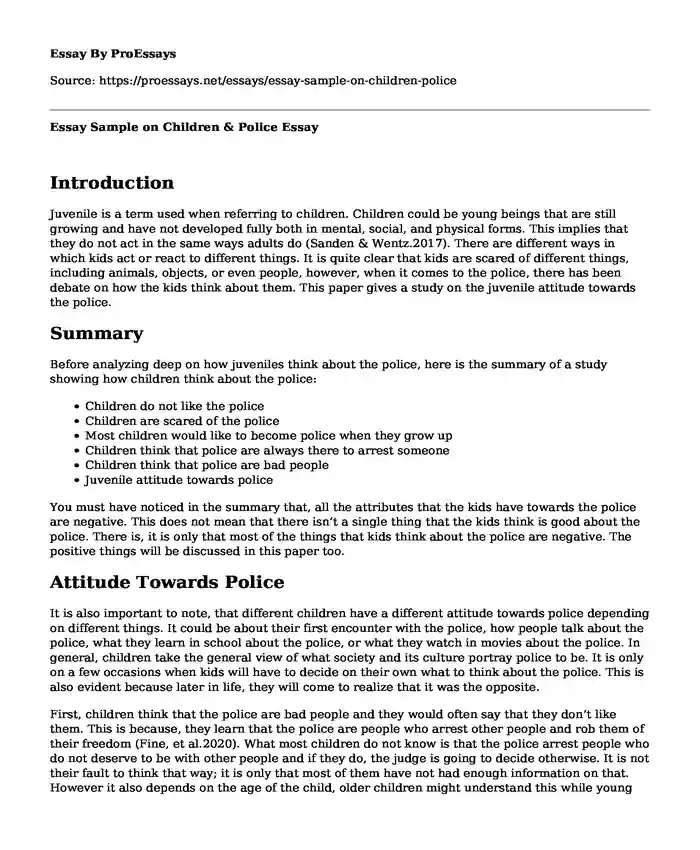Introduction
Juvenile is a term used when referring to children. Children could be young beings that are still growing and have not developed fully both in mental, social, and physical forms. This implies that they do not act in the same ways adults do (Sanden & Wentz.2017). There are different ways in which kids act or react to different things. It is quite clear that kids are scared of different things, including animals, objects, or even people, however, when it comes to the police, there has been debate on how the kids think about them. This paper gives a study on the juvenile attitude towards the police.
Summary
Before analyzing deep on how juveniles think about the police, here is the summary of a study showing how children think about the police:
- Children do not like the police
- Children are scared of the police
- Most children would like to become police when they grow up
- Children think that police are always there to arrest someone
- Children think that police are bad people
- Juvenile attitude towards police
You must have noticed in the summary that, all the attributes that the kids have towards the police are negative. This does not mean that there isn’t a single thing that the kids think is good about the police. There is, it is only that most of the things that kids think about the police are negative. The positive things will be discussed in this paper too.
Attitude Towards Police
It is also important to note, that different children have a different attitude towards police depending on different things. It could be about their first encounter with the police, how people talk about the police, what they learn in school about the police, or what they watch in movies about the police. In general, children take the general view of what society and its culture portray police to be. It is only on a few occasions when kids will have to decide on their own what to think about the police. This is also evident because later in life, they will come to realize that it was the opposite.
First, children think that the police are bad people and they would often say that they don’t like them. This is because, they learn that the police are people who arrest other people and rob them of their freedom (Fine, et al.2020). What most children do not know is that the police arrest people who do not deserve to be with other people and if they do, the judge is going to decide otherwise. It is not their fault to think that way; it is only that most of them have not had enough information on that. However it also depends on the age of the child, older children might understand this while young ones might not. Children also think that the police are the most superior people and for that matter, they would say they want to become one when they grow up. They imagine that by being a police officer, no one would arrest or suppress them but rather you will be the one arresting people.
Conclusion
Children also learn that police are responsible for the security and order of a country or whatever the administration part and so some have learned love he police. They learn the good deeds of the police in school, through their parents or in movies and they develop some positive attitude towards the police.
The problem is that children do not get the full information about the police and they tend to capture the negative part of the police making them have a negative attitude towards the police. This is affirmed by the fact that police engage in a chase down and arrest which may be a bit disturbing to children.
References
Sanden, M., & Wentz, E. (2017). Kids and cops: Juveniles’ perceptions of the police and police services. Journal of contemporary criminal justice, 33(4), 411-430.
Fine, A. D., Padilla, K. E., & Tom, K. E. (2020). Police legitimacy: identifying developmental trends and whether youths’ perceptions can be changed. Journal of Experimental Criminology, 1-21.
Cite this page
Essay Sample on Children & Police. (2023, Nov 16). Retrieved from https://proessays.net/essays/essay-sample-on-children-police
If you are the original author of this essay and no longer wish to have it published on the ProEssays website, please click below to request its removal:
- Local Law Enforcement and Illegal Immigrants Essay
- Workers in the Cane Essay
- Intertwining Autobiographical Events in A Farewell to Arms
- Zero Tolerance Policies in Schools Essay Example
- Story of Evil Criminology Essay Example
- University Attending: My Reasons and Advantages - Essay Sample
- Admissible Evidence: Relevant, Material, and Competent - Essay Sample







